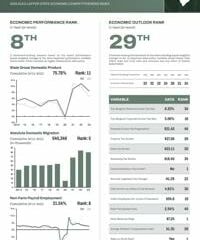News from the South - Kentucky News Feed
Kentucky lawmakers, education officials discuss school funding shortfall • Kentucky Lantern
Kentucky lawmakers, education officials discuss school funding shortfall
by McKenna Horsley, Kentucky Lantern
February 11, 2025
FRANKFORT — Kentucky Department of Education officials appeared before a House subcommittee Wednesday morning to discuss a state funding shortfall that could impact local school districts.
Last month, Education Commissioner Robbie Fletcher wrote in a memo that KDE is predicting a SEEK funding shortfall of about $40 million in the 2024-25 academic year, after “a detailed review of preliminary data.”
On Tuesday, Fletcher told lawmakers that multiple factors that go into the SEEK formula, such as growth in the numbers of students and English language learners and change in property values, were different than what was projected. He called the process of arriving at estimates “a consensus building process between the Office of State Budget Director” and KDE.
“We arrive at numbers on a very complex modeling and of course, this modeling happened in the fall of 2023, so … we’re at the point now having to deal with what was projected in 2023,” Fletcher said.
The KDE officials appeared before the House Budget Review Subcommittee on Primary and Secondary Education and Workforce Development to discuss the data used to predict how much money the legislature should budget for schools under SEEK, or Support Education Excellence in Kentucky,
The formula determines the amount of state funding to local school districts. It has a base per-pupil funding allocation, along with additional funding for factors like transportation costs or the number of students in a district who qualify for additional resources like special education, free or reduced-price meals and English language assistance.
Fletcher wrote in his January memo that a SEEK shortfall previously occurred four times between fiscal years 2010 and 2024.
Of the $40 million shortfall predicted for this year, $14.7 million of the amount is required under state law. The remaining $26 million is designated for local school districts if funds are available.
According to KDE’s presentation, if no action is taken on the shortfall, the $14.7 million would come out of monthly payments given to school districts between April and June. Chay Ritter, the director of the Division of District Support in KDE, gave an example of how Jefferson County Public Schools, the state’s largest district, could be impacted if no action is taken on the shortfall. The district would receive $1.3 million less than the SEEK calculation this fiscal year.
“Making that cut for some districts, it may be a hiccup. For others, it may be pretty rough,” Ritter said. “So, we’re very conscious of that, and that’s why we obviously try to avoid that.”
A presentation slide showed that estimates of various factors in the SEEK formula were within 0.2% to 10.1% of the actual cost. The required $14.7 million is about 0.5% of the $2.7 billion appropriated for schools through SEEK.
Last Tuesday, Republican House Speaker David Osborne, of Prospect, reiterated comments he made after KDE raised the alarm on a possible SEEK funding shortfall. Osborne said it was a “disturbing trend” to “continue to see bad information and bad data.” He added that it has been “several years now that we have seen inaccurate information.”
“I don’t think it’s intentional, but there’s a disconnect somewhere in getting us good information,” Osborne said. “That’s all we have when we make budgets, is the information that we’re given on those things. So for us to construct a budget, we’ve got to have good data going in.
Osborne said that the data comes from a combination of what KDE provides and what the legislature requests. When asked if that process could change in the future, Osborne said “it very well could.
Meanwhile, Republican Senate President Robert Stivers, of Manchester, told reporters that he had been in conversations with KDE about the predicted SEEK funding shortage.
“There was a little bit of an undercount, but not much,” he said. “There was an impact of increased property taxes. So, there were several components to this that caused us to have a shortfall, but it’s not unusual that occurs because different things happen.”
Stivers said adjustments have been made before on SEEK funding throughout his time in the legislature.
Kentucky Lantern is part of States Newsroom, a nonprofit news network supported by grants and a coalition of donors as a 501c(3) public charity. Kentucky Lantern maintains editorial independence. Contact Editor Jamie Lucke for questions: info@kentuckylantern.com.
News from the South - Kentucky News Feed
Ohio river finally drops below flood stage Sunday
SUMMARY: The Ohio River is finally receding after weeks of flooding, with levels expected to drop below flood stage by Sunday. The river crested at 36.6 feet on Wednesday but has since dropped to 32.4 feet. Despite some areas, like the Great Lawn, still being submerged, the water should continue to recede by early next week. This weekend will bring sunny weather with temperatures in the upper 50s to low 60s on Saturday and near 70 on Sunday. While conditions improve, chilly temperatures overnight may cause frost, and allergy sufferers should prepare for worsening tree pollen levels.

WLKY meteorologist Eric Zernich’s Friday evening forecast
Subscribe to WLKY on YouTube now for more: http://bit.ly/1e5KyMO
Get more Louisville news: http://www.wlky.com
Like us: http://www.facebook.com/wlkynews
Follow us: http://twitter.com/WLKY
Instagram: https://www.instagram.com/wlky/
News from the South - Kentucky News Feed
WLKY Investigates: Judge calls decision not to renew Baxter 942’s liquor license ‘unreasonable’
SUMMARY: Baxter’s 942 bar, closed for five months after its liquor license was not renewed, could soon reopen following a judge’s recommendation to restore the license. The closure followed community complaints about noise and violence, including shootings near the bar, although not on its property. The judge ruled that denying the license based on third-party criminal activity was unreasonable. Despite the ruling, local neighbors, especially those at a nearby dog park, oppose the bar’s reopening. Louisville Metro ABC has 15 days to file for an exception, with the final decision resting with a three-judge panel.

WLKY Investigates: Judge calls decision not to renew Baxter 942’s liquor license ‘unreasonable’
Subscribe to WLKY on YouTube now for more: http://bit.ly/1e5KyMO
Get more Louisville news: http://www.wlky.com
Like us: http://www.facebook.com/wlkynews
Follow us: http://twitter.com/WLKY
Instagram: https://www.instagram.com/wlky/
News from the South - Kentucky News Feed
Evening weather forecast 4/10/2025
SUMMARY: The evening weather forecast for April 10, 2025, predicts isolated storms in parts of Kentucky, with thunderstorms weakening in some areas. Severe weather, including wind and hail, is expected to remain more likely in the southwest. A severe thunderstorm watch is in effect for Russell County until 10:00 PM. Showers will continue into the early morning, clearing by midday on April 11, with temperatures dropping to the 40s overnight. The weekend will bring partly cloudy to mostly sunny weather with temperatures in the 50s and 60s. Another round of severe weather is expected by Monday in northern Kentucky.

FOX 56 meteorologist Justin Esterly shares our Thursday evening forecast, noting a watch for severe weather in western and …
-

 News from the South - Arkansas News Feed6 days ago
News from the South - Arkansas News Feed6 days agoArkansas State Police launches new phone-free campaign
-

 News from the South - Missouri News Feed6 days ago
News from the South - Missouri News Feed6 days agoLocals react to Cara Spencer winning mayoral race
-

 News from the South - North Carolina News Feed6 days ago
News from the South - North Carolina News Feed6 days agoProposal: Farm property tax break on solar from 80% to zero | North Carolina
-

 News from the South - Arkansas News Feed4 days ago
News from the South - Arkansas News Feed4 days agoMeasles cases confirmed in Arkansas children after travel exposure
-

 Mississippi Today7 days ago
Mississippi Today7 days agoWard 6 council candidates face the image of south Jackson versus the reality
-

 News from the South - North Carolina News Feed5 days ago
News from the South - North Carolina News Feed5 days agoTax Day of April 15 is essentially May 1 in North Carolina | North Carolina
-

 News from the South - Texas News Feed6 days ago
News from the South - Texas News Feed6 days agoKSAT's Patty Santos speaks with Poteet Strawberry Festival court members, organization VP
-

 Mississippi Today4 days ago
Mississippi Today4 days agoA self-proclaimed ‘loose electron’ journeys through Jackson’s political class












































